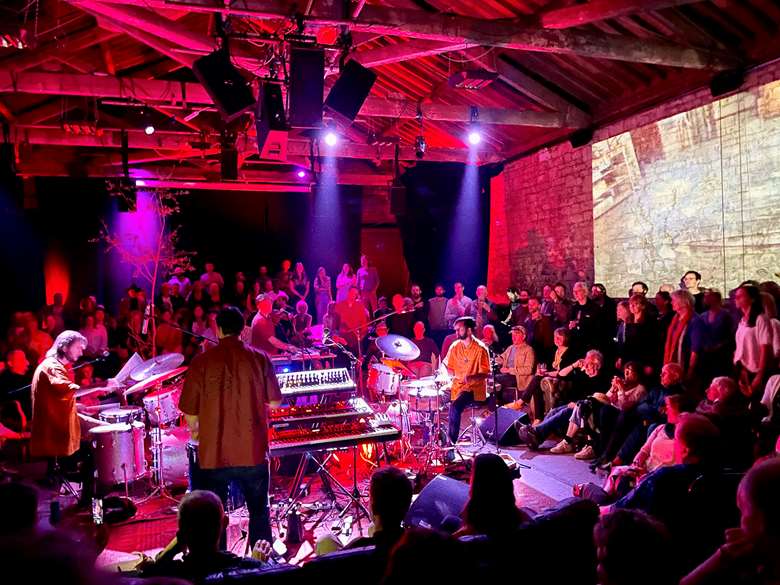Sarathy Korwar and Colectiva power up Jazz Stroud Festival
Peter Jones
Wednesday, May 31, 2023
The Cotswolds-based jazz festival kicked things up a gear this year with four nights of intimate and exciting performances

While big commercial festivals like EFG London, Love Supreme and Cheltenham hoover up a great deal of the UK jazz community’s attention, most of the action around the country is going on at grassroots level. A particularly good example of this is Jazz Stroud in Gloucestershire. Last weekend saw a remarkably well-planned and varied festival, with the accent on new and younger performers. Spread across three venues, its biggest attractions were Yazmin Lacey, Alabaster Deplume and Laura Misch, along with some fascinating new and lesser-known talent.

China Bowls - Photo by Tony Benjamin
At a hip little bar known as SVA (Stroud Valleys Artspace), the vibe was sofas and pot plants - the perfect setting for singer-songwriter China Bowls. A Bristolian now based in London, she was accompanied by two musicians who were also performing at the festival with other bands - Lya Guerrero (drums) from Colectiva – see below – and Mei Kirby, keyboards (also for another vocalist, Plumm). Bowles herself plays guitar and sounds like an amalgam of Erykah Badu and Amy Winehouse, with a set of sophisticated, languid songs in the neo-soul style that one could imagine sounding even better with a bass and horn section added. She is one to watch.
St Laurence’s Church provided a slightly more formal space for the intriguing Bristol-based Tyrani Collective - four women and three men, all of them singers and several of them percussionists. Propelled by clattering side drums, their music was a postmodern mash-up of tribal chants, occasional classical chorale, tricky time signatures and hints of Bulgarian harmony. It was technically difficult music, but emotionally powerful, and sometimes alarming: what were they singing about? It was hard to tell, since the lyrics were often word-like rather than actual words. But there were hints of climate apocalypse in titles like ‘Bitter Water’.

Tyrani Collective - Photo by Tony Benjamin
The gig that followed provided a complete contrast: the piano trio Yetii have enjoyed a successful residency at Bristol’s Greenbank for the last few years. Led by Alex Veitch, with Ashley John Long on bass and Alex Goodyear on drums, their set was more in the recognised jazz tradition - lyrical, meditative music, spacious enough to benefit from the barrel-vaulted church’s excellent acoustics. Veitch’s compositions and playing style are reminiscent of English pastoral composers like Bax, Butterworth or Vaughan Williams, even on a jazz standard like Cole Porter’s ‘Everything I Love’. All played with great beauty and sensitivity, but it was Long who was outstanding, somehow tweaking sliding harmonics and the high-pitched bird calls from his double bass. A standing ovation greeted the end of their set.

Yetii - Photo by Tony Benjamin
A different experience again was to be had at the cavernous Brunel Goods Shed. This venue hosted the weekend’s biggest acts, the highlight of which was the increasingly impressive all-female latin ensemble Colectiva, whose performance was driven by the raw, clattering power of its rhythm players: drummer Lya Guerrero, percussionist Lilli Elina and bassist Alley Lloyd. At the front, trombonist Viva Msimang gave no quarter in articulating the band’s feminist credo, introducing the ironically-titled ‘How Do You Like Your Ladies?’ by recalling the intense rage they felt when composing it.
Colectiva’s barnstorming performance inadvertently posed a problem for the singer Yazmin Lacey, who had to follow them with her laid-back bedsitter soul, culled largely from her well-received recent album Voice Notes. Even with the energy supplied by Sarah Tandy on keys and the great Sam Jones on drums, it was as if Lacey was somehow trapped inside the cloud of orange smoke that enveloped her on stage, singing in a dreamlike murmur, as if to a friend standing next to her. There was an interesting comparison to be made the following evening with another floaty, spacey female singer - Laura Misch - who performed in-the-round at the Goods Shed, with the audience sitting or standing on all sides of the space. Beginning her set on alto sax, with guitarist Tomâś Kaspár on guitar, Misch’s sweet, melancholy tunes seemed well suited to this unconventional set-up. Sometimes she simply sang and played guitar; the minimalism of her approach left her exposed, but worked perfectly for the material.
The final show of the festival was another example of clever programming by its organisers. Maximizing the impact of the circular set-up, Sarathy Korwar presented an extraordinary update on the old hippie “happenings” of the late 1960s. Back-projected video images and sweeping light effects combined with the band’s jazzy Indo-futurism to create a pleasingly trippy experience. Korwar himself was one of two drummers; they were joined by a matching pair of synthesiser-players, who approximated the drones and twangs of traditional Indian instrumentation. There wasn’t really anything you would call melody - it was all about the wall of sound.